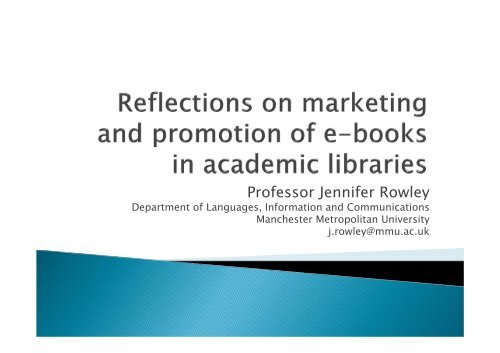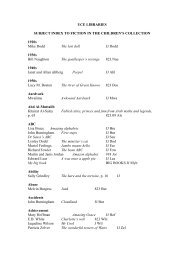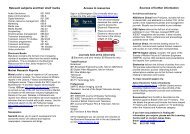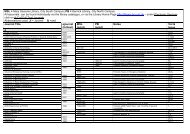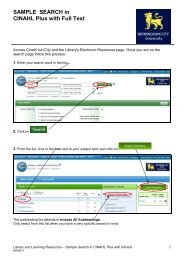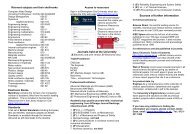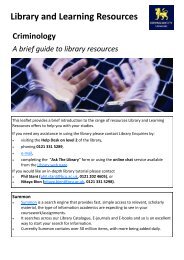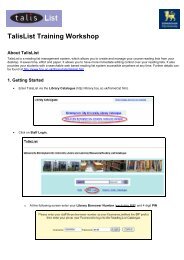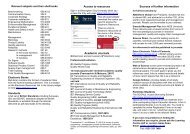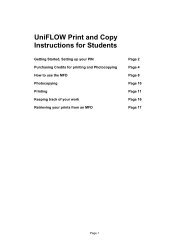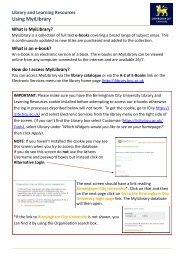powerpoint slides - Birmingham City University. Library and ...
powerpoint slides - Birmingham City University. Library and ...
powerpoint slides - Birmingham City University. Library and ...
Create successful ePaper yourself
Turn your PDF publications into a flip-book with our unique Google optimized e-Paper software.
Professor Jennifer Rowley<br />
Department of Languages, Information <strong>and</strong> Communications<br />
Manchester Metropolitan <strong>University</strong><br />
j.rowley@mmu.ac.uk
Context<br />
◦ Making e-books available <strong>and</strong> encouraging their<br />
use<br />
◦ Our research<br />
Communication<br />
◦ Taking a strategic approach to marketing <strong>and</strong><br />
promotion<br />
◦ Innovation in marketing communications<br />
◦ Influencing through word-of-mouth<br />
Challenges<br />
Conclusion<br />
R<br />
e
E-books have the potential to be even more<br />
significant for libraries <strong>and</strong> learners than e-<br />
journals<br />
◦ the centrality of textbooks to learning in higher<br />
education<br />
◦ the opportunities to develop e-books as interactive<br />
learning resources.<br />
E-books are no longer new to academic libraries,<br />
but<br />
◦ adoption by academic staff <strong>and</strong> students is often slow<br />
◦ libraries are hindered in their attempts to provide a<br />
reliable <strong>and</strong> responsive e-book service:<br />
Licences<br />
Technology<br />
Publisher’s decisions on availability.
The starting point for this paper is our<br />
research on:<br />
◦ The e-book management framework<br />
Marketing <strong>and</strong> promotion was identified as an<br />
important aspect of e-book management<br />
Semi-structured interviews were conducted<br />
with 25 academic librarians, in seven case<br />
study libraries, holding posts as: subject<br />
librarians, e-resources librarians, or<br />
cataloguers.
Libraries <strong>and</strong> Marketing<br />
◦ Academic libraries often lack a marketing mind set<br />
Including e-books in the library catalogue is providing<br />
information <strong>and</strong> access, not marketing….<br />
Digital marketing innovations are often one-off <strong>and</strong><br />
not embedded in wider strategies.<br />
The Competition<br />
◦ E-book marketing in the consumer marketplace –<br />
Amazon, Barnes & Noble, iBookstore:<br />
buying <strong>and</strong> reading through mobile devices<br />
User expectations
‘Academic libraries can no longer sit in their ivory towers<br />
waiting for customers – students, faculty, <strong>and</strong> staff – to<br />
use their libraries. We no longer have a captive audience.<br />
The competition is greater because we are no longer the<br />
only information service game in town’ (Alire, 2007;p.<br />
546).<br />
Spalding <strong>and</strong> Wang (2006) suggest that only by using<br />
marketing principles <strong>and</strong> techniques can libraries:<br />
◦ better underst<strong>and</strong> their users’ needs,<br />
◦ justify funding,<br />
◦ communicate more effectively with a variety of external audiences,<br />
<strong>and</strong><br />
◦ achieve greater efficiency <strong>and</strong> optimal results in delivering<br />
products <strong>and</strong> services to meet the identified needs of their clients.
Consistent with other research in this area, none of the<br />
libraries in our research had a formalised strategy for the<br />
marketing of any e-resources.<br />
Yet, most of the interviewees felt that the development of a<br />
formulated strategy was needed.<br />
Some differences of opinion:<br />
‘formalised planning for marketing of specific resources would be better<br />
than individual subject specialists trying to do something. If we did it as<br />
a library marketed br<strong>and</strong>ed thing, it would make us more accessible to<br />
students <strong>and</strong> our resources more accessible’<br />
‘I think that it is less of an issue because people are very aware that they<br />
(e-resources) are there <strong>and</strong> they are happy to look for any information<br />
on the Internet’<br />
‘You don’t want to raise expectations beyond what you can actually<br />
supply but at the same time you want to build up usage to justify<br />
developing the e-books strategy. Nobody is going to put money into e-<br />
books if the students aren’t using them.’
Top 11 tools mentioned in relation to e-book promotion in<br />
academic libraries<br />
Number of interviewees Tools for promotion<br />
21 <strong>Library</strong> website<br />
21 Information literacy sessions<br />
20 OPAC<br />
18 Induction sessions<br />
16 In person instruction<br />
14 E-mails<br />
9 Posters<br />
8 Course committee meetings<br />
8 Events<br />
8 Online help<br />
7 VLE
E-channels<br />
◦ <strong>Library</strong> website inc. library web page devoted to e-resources,<br />
library news webpage, subject guides, subject specific web pages<br />
<strong>and</strong> online reading lists.<br />
◦ OPACs – inc. access to reading lists via the OPAC, <strong>and</strong> e-resources<br />
search option<br />
People channels<br />
◦ Information literacy sessions<br />
◦ Induction sessions<br />
◦ In person instruction<br />
◦ E-mails<br />
Others mentioned, but not in top 11:<br />
◦ Newsletters, flyers, announcement boards, library reps, word of<br />
mouth, blogs, bulletins, display screens, marketing campaign<br />
(One library only)
Some other examples:<br />
Red Rocks Community College (Lakewood, CO, US)<br />
◦ Circulated iPads <strong>and</strong> Kindles to students<br />
◦ Students allowed to purchase their own books – <strong>and</strong> develop the<br />
library’s e-book collection<br />
◦ Text bombs – student staffers were asked to text library<br />
announcements to their friends, <strong>and</strong> so on.<br />
<strong>University</strong> of the West Indies at Mona<br />
◦ E-book public awareness campaign to promote e-book use<br />
<br />
<br />
<br />
<br />
<br />
<br />
Training staff, faculty <strong>and</strong> students<br />
Adding links to the library’s website<br />
Writing articles for the library’s newsletter<br />
Broadcasting short messages via the Campus intranet service<br />
Printing fliers <strong>and</strong> placing them on notice boards around campus<br />
Targeting key individuals, such as faculty deans <strong>and</strong> department heads,<br />
<strong>and</strong> sending them informational letters.
Have you looked at the competition<br />
E.g. How do Amazon sell their e-books<br />
◦ Sell the Kindle through the same website<br />
◦ Kindle eBooks – a br<strong>and</strong><br />
◦ Lots of different ‘recommendation’ lists:<br />
Best Books: Best Books 2012; Best selling Kindle books (in<br />
featured categories); Winter Reads in Kindle; Editors Picks<br />
Coming soon: National Book Awards 2012 Shortlist; Popular<br />
Pre-orders; Coming soon to Kindle;<br />
Customer review <strong>and</strong> recommendation: Customers who<br />
bought this item also bought..; Tag this product; Customer<br />
reviews; Customer discussions.<br />
Product description <strong>and</strong> details.
MMU <strong>Library</strong> Website - One way to find e-books<br />
Electronic resources<br />
E-books<br />
E.g Dawsonera<br />
Terms <strong>and</strong> conditions of use page<br />
Access to the service, links to other sites, intellectual<br />
property rights – need to Accept<br />
Dawsonera<br />
Latest books on Dawsonera<br />
Most read by your institution<br />
Most read on Dawsonera<br />
Or, e.g. The Classic Bookshelf<br />
Completely different interface.
Many studies have identified the importance<br />
of academics in encouraging student use of<br />
e-resources.<br />
Our study – Some academics:<br />
◦ recommend e-books to students<br />
◦ Demonstrate e-books to students<br />
◦ Add information on how to use e-books etc to the<br />
VLE<br />
◦ Collaborate with library staff in developing courses<br />
on the use of e-resources, inc. e-books.
Issues <strong>and</strong> challenges in the promotion of e-books are<br />
often associated with the challenges in other aspects of e-<br />
book management...licences, technology, availability<br />
Focussing on comments from librarians in our research:<br />
◦ Lack of time to plan <strong>and</strong> undertake marketing<br />
◦ Raising unrealistic expectations<br />
“One thing is that [e-book promotion] raises people’s expectations<br />
especially when the people find that they cannot print them out”.<br />
◦ Insufficient e-book stock in the library<br />
‘The main thing is that there isn’t enough stock. You are trying to push<br />
something that isn’t generally available for the students to use.’
◦ Accessibility <strong>and</strong> use issues<br />
‘people can be put off by e-books because of accessibility<br />
issues’<br />
‘different means of accessing ….. different platforms <strong>and</strong><br />
models’<br />
◦ Budget constraints, affecting size of e-book collections,<br />
scope for responding pricing changes etc.<br />
◦ OPAC visibility or invisibility (associated with metadata<br />
issues)<br />
◦ Market availability of suitable books<br />
‘One of the issues partially is still the availability…not all the<br />
titles are available as e-books’
Key agendas <strong>and</strong> actions going forward:<br />
◦ Developing a marketing strategy <strong>and</strong> a supporting<br />
marketing communications strategy in order to:<br />
coordinate marketing actions,<br />
ensure that all staff have shared views on key aspects such<br />
as audience, message, channels objectives<br />
make effective use of marketing campaigns.<br />
◦ Proactively managing the inherent tensions between<br />
promotion <strong>and</strong> the capacity to respond to increased<br />
dem<strong>and</strong>, <strong>and</strong>:<br />
moderating promotion accordingly<br />
keeping library <strong>and</strong> academic staff engaged through<br />
effective internal marketing.
Key agendas <strong>and</strong> actions going forward Contd.<br />
◦ Continuing to innovate in the range of promotion tools,<br />
including:<br />
the use of promotional tools that facilitate two-way<br />
communication with users, such as social media<br />
honing appreciation of the different roles of different tools<br />
<strong>and</strong> their suitability for different user groups.<br />
◦ Taking a strategic approach to influencing word-ofmouth,<br />
considering:<br />
both digital <strong>and</strong> face-to-face<br />
engaging <strong>and</strong> communicating with academics <strong>and</strong> students<br />
integrating word-of-mouth into a wider marketing<br />
communications strategy.
Alire, C.A. (2007), “Word-of-mouth marketing: ab<strong>and</strong>oning the<br />
academic library ivory tower”, New <strong>Library</strong> World, Vol. 108 Nos<br />
11/12, pp. 545-551.<br />
Anson, C. <strong>and</strong> Connell, R.R. (2009), “E-book collections: ARL<br />
SPEC Kit 313”, Association of Research Libraries Washington, DC.<br />
Lonsdale, R. <strong>and</strong> Armstrong, C. (2010), “Promoting e-your<br />
books: lessons from the UK JISC National e-Book Observatory”,<br />
Program, Vol. 44 No 3, pp.185-206<br />
Spalding, H.H. <strong>and</strong> Wang, J. (2006), “The challenges <strong>and</strong><br />
opportunities of marketing <strong>and</strong> academic libraries in the USA:<br />
experiences of US academic libraries with global application”,<br />
<strong>Library</strong> Management, Vol. 27 Nos 6/7, pp. 494-504.<br />
Vasileiou, M <strong>and</strong> Rowley, J (2011) Marketing <strong>and</strong> promotion of e-<br />
books in academic libraries. Journal of Documentation, Vol.67,<br />
No.4, pp.624-643.


